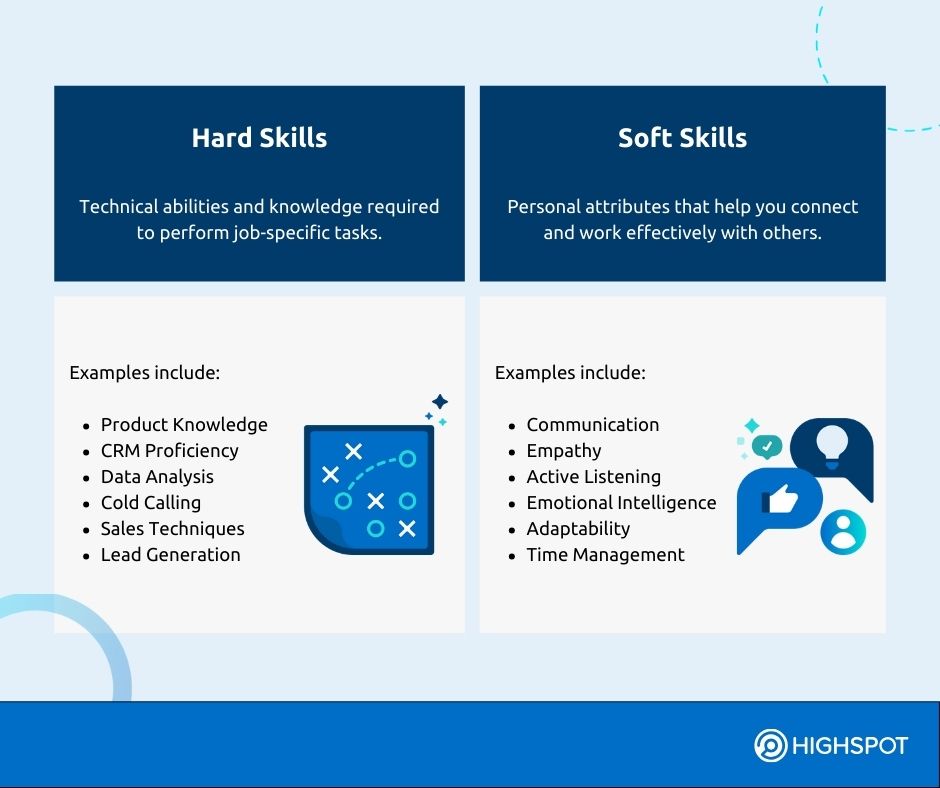Key Takeaways
- Strong soft skills are just as important, if not more so, than technical expertise for sales success.
- Research shows that 85% of job success hinges on soft skills, while only 15% is tied to technical skills.
- Attributes such as empathy, communication, and critical thinking directly influence sales performance.
Sales reps often juggle multiple demands—meeting quotas, showcasing product value, and forming authentic customer connections—which require a healthy mix of soft and hard skills. Yet, a rapidly changing landscape of technologies and buyer expectations can outpace professional development and overwhelm even seasoned professionals. In fact, 64% of managers don’t think their employees can keep pace with future skill needs, and 70% of employees say they haven’t even mastered the skills they need for their jobs today.
Soft skills training programs help bridge this gap by providing reps with interactive techniques for excelling, driving consistent results, and building stronger client relationships.
In this article, we’ll explore the 10 essential soft skills every sales professional needs, show how to develop a training program that addresses these skills, and provide a handy self-assessment checklist to guide continuous improvement.
What is Soft Skills Training?
Soft skills training helps sales teams learn to work well with colleagues and customers. It teaches them important skills like listening closely, showing empathy, and being flexible. By using these skills, sales reps can build stronger relationships and perform better overall.
Common training techniques include interactive workshops, role-playing exercises, and ongoing coaching. For example, a sales rep honing active listening might role-play with colleagues or managers by asking open-ended questions, thus uncovering more profound customer pain points and then offering personalized solutions.
Why Soft Skills Matter in Sales
While hard skills have traditionally taken center stage, soft skills are essential for success in today’s more emotionally charged world. In fact, Harvard University research shows that 85% of job success stems from well-developed soft skills, with only 15% tied to technical skills.
In sales, interpersonal skills, such as empathy, patience, and EQ, shape how reps communicate effectively with prospects, handle objections with care, and build meaningful customer relationships. Your entire go-to-market team also relies on these abilities to create seamless experiences for buyers at each stage of the buyer’s journey. McKinsey notes that as intelligent machines take over more physical, repetitive, and basic cognitive tasks, sales reps will need social, emotional, and technological skills to stand out. For instance, showing empathy during a discovery call can make a client more comfortable revealing hidden priorities, leading to more personalized solutions and stronger rapport.
Hard Skills vs Soft Skills
Although soft skills build trust and connection, hard skills are still necessary. Hard skills are job-specific knowledge, such as CRM proficiency, product expertise, or proposal writing, while soft skills center on interpersonal and emotional abilities like communication, empathy, and resilience. In other words, hard skills guide what sales reps sell, and soft skills determine how they sell to prospects.
For example, your sales methodology creates a structured framework for deal progression. Knowing a product’s technical details is important, but actively listening and caring about what ails the client builds the trust that ultimately closes deals. When hard and soft skills come together, overall sales performance soars, giving reps the confidence and positive attitude to achieve results consistently.

Benefits of Soft Skills Training Online
Soft skills development can be challenging in general, as some talents like empathy or emotional intelligence tend to come more naturally to some than others. These challenges compound when teams are spread across different regions and may only meet in person once or twice a year.
Online soft skills training is a scalable, flexible, and cost-effective way to accommodate the busy schedules of remote or traveling team members. Through a learning management system (LMS), you can offer videos, simulations, and interactive quizzes, as well as create a personalized learning path for each participant. This allows them to learn at their own pace and apply new behaviors in real-life scenarios right away.
These online training and development programs can also replicate everyday sales situations through role-playing exercises, where sales reps practice handling objections in simulated calls or meetings. By incorporating gamification—such as awarding points for completing modules, winning scenario-based challenges, and climbing a leaderboard—trainers add a competitive, fun element that increases engagement.
Leaders can also track real-time progress through data analysis, guiding reps to build the confidence they need to handle challenging conversations and negotiations. As a result, sales managers can quickly upskill or reskill their teams, while saving time and resources.
10 Must-Have Soft Skills for Sales Professionals
With training strategies in place, it’s time to focus on the specific people skills that impact performance. Sales professionals truly thrive when they master a wide range of soft skills, from communication to adaptability. All of these consultative selling factors contribute to stronger client relationships.
Below are the top 10 skills to nurture:
1. Communication
31% of professionals lack strong communication skills, highlighting a gap that can impact sales outcomes. Clear, concise public speaking and active listening skills are cornerstones of sales success.
Non-verbal cues, like maintaining eye contact and nodding, show genuine interest. For instance, a rep might repeat a key point made by the prospect to confirm understanding.
Over time, honing these techniques naturally leads to effective presentation skills, which enable reps to deliver more compelling and impactful messages.
2. Empathy
Understanding a customer’s perspective builds trust and loyalty. Demonstrating empathy can be as simple as acknowledging a buyer’s frustration about their current situation or validating their points before proposing a new approach.
3. Time Management
Effective time management helps sales reps prioritize tasks, prepare for calls, and meet deadlines. Using a simple project management tool or time-blocking method can reduce stress and allow them to focus on higher-value activities like prospecting and follow-up conversations.
4. Critical Thinking
37% of HR professionals report difficulty recruiting candidates with problem-solving, critical thinking, innovation, and creativity skills. Strategic thinking helps sales reps tailor pitches that address complex buyer needs. It involves analyzing data, anticipating objections, and proposing solutions. Without being prompted, an innovative and critical-thinking rep might weigh different financing options for a customer’s unique budget constraints.
5. Emotional Intelligence
Managing emotions, both your own and the customer’s, is key to resolving objections and de-escalating tense negotiations. Staying calm under pressure and reading body language and subtle emotional cues can transform difficult conversations into productive outcomes.
6. Growth Mindset
Reps with a growth mindset embrace feedback and view challenges as learning opportunities. For example, after losing a deal, they reflect on what went wrong, adapt their approach, and become stronger for future pitches.
7. Adaptability
Market conditions and product offerings often change rapidly. Adaptable reps can pivot their strategy mid-pitch if they sense a prospect’s needs or mood shifting, demonstrating flexibility that resonates with customers seeking tailored solutions.
8. Collaboration
Working with cross-functional teams—like marketing, product, or customer success—ensures consistent messaging and quicker client problem resolution. Collaborative skills also help resolve conflicts, enhance teamwork, and increase employee retention because the work environment is more tolerable.
9. Resilience
Sales can be demanding, with frequent rejections or setbacks. Resilient reps bounce back quickly, maintaining motivation and energy. Building resilience might involve regular self-reflection or seeking mentorship for continuous support.
10. Negotiation skills
Sales negotiation includes pricing and finding mutually beneficial terms using your trusted relationship. Good negotiators listen actively, ask probing questions, and identify areas where they can add value without losing margins.
Soft Skills Self-Assessment Template
Use this simple template to gauge how you or your team demonstrate soft skills. Identifying gaps in communication, empathy, adaptability, and other soft skills allows you to create a personalized training plan that boosts team member performance.
| Soft Skill | Rating (1-5) | Observed Behaviors/Examples | Recommended Next Steps |
|---|---|---|---|
| Communication | E.g., Frequently uses filler words; struggles with active listening | – Attend a communication skills workshop – Practice mock pitches and get feedback | |
| Empathy | E.g., Rarely reflects customer concerns; lacks response to emotional cues | – Shadow a top-performing empathetic rep – Use role-play scenarios to improve | |
| Time management | E.g., Regularly misses deadlines; feels disorganized | – Adopt time-blocking methods – Use project management tools | |
| Critical thinking | E.g., Relies on scripts; difficulty tailoring solutions to unique needs | – Engage in problem-solving exercises – Analyze customer data for deeper insights | |
| Emotional intelligence | E.g., Shows frustration when challenged; struggles to read the room | – Practice mindfulness techniques – Learn conflict resolution strategies | |
| Growth mindset | E.g., Avoids feedback; shows little interest in personal development | – Set personal learning goals – Seek a mentor for ongoing support | |
| Adaptability | E.g., Resists changes to sales scripts; slow to adjust when market shifts | – Rotate through different project teams – Stay updated on product changes | |
| Collaboration | E.g., Works in silos; minimal cross-team communication | – Schedule regular team stand-ups – Partner with cross-functional peers | |
| Resilience | E.g., Demotivated after rejection; dwells on past failures | – Maintain a reflection journal – Celebrate small wins and progress | |
| Negotiation skills | E.g., Only discounts pricing; overlooks non-monetary terms | – Attend negotiation workshops – Practice negotiation role-plays |
How to Create an Engaging Soft Skills Training Program
Building an engaging soft skills training program requires a clear understanding of skill gaps, a well-structured curriculum, and ongoing reinforcement. Sales leaders can encourage meaningful behavioral changes by combining workshops, role-play exercises, and consistent feedback.
Follow these four steps to develop a valuable soft skills training program:
- Assess competencies and gaps: Use surveys, one-on-ones, and performance data to identify which soft skills need immediate attention. Pinpointing these gaps makes designing relevant, focused training modules and learning paths easier.
- Create a training plan: Outline objectives, timelines, and resources. Remember to include sales onboarding as an ideal time to begin developing soft skills. Use a sales training platform (e.g., Highspot) for scalable content delivery and easy learner progress tracking.
- Develop soft skills courses: Each sales rep learns differently, so incorporating multiple formats ensures every individual can absorb, practice, and apply new behaviors. Launch with soft skills training workshops to introduce fundamental concepts, role-play exercises to simulate real-life scenarios, sales coaching or mentoring for personalized guidance, live interactive sessions for collaboration, and e-learning modules for flexible, self-paced learning.
- Measure progress: Track engagement and results through quizzes, role-play outcomes, and performance metrics. Provide continuous coaching to reinforce learning, adjust courses as needed, and celebrate incremental improvements to motivate reps.
Read our sales training guide for more on building flexible training programs that go beyond basic teaching to modernize your sales training approach.
Elevate Your Sales Team with Soft Skills Training
Soft skills training offers an edge that helps sales teams stand out, adapt to shifting markets, and foster customer loyalty. Managers can unlock higher performance across the board by consistently reskilling and upskilling reps through modern learning methods. Investing in these capabilities positions organizations for success in an AI-driven world.
The need to reskill and upskill will only intensify as tech advances with AI. According to Gartner, 85% of business leaders agreed that the need for skills development will dramatically increase as digital and AI trends continue to disrupt work. Highspot’s training and coaching capabilities revolutionize how sales managers coach their teams and how reps learn and apply new skills in their everyday work.




